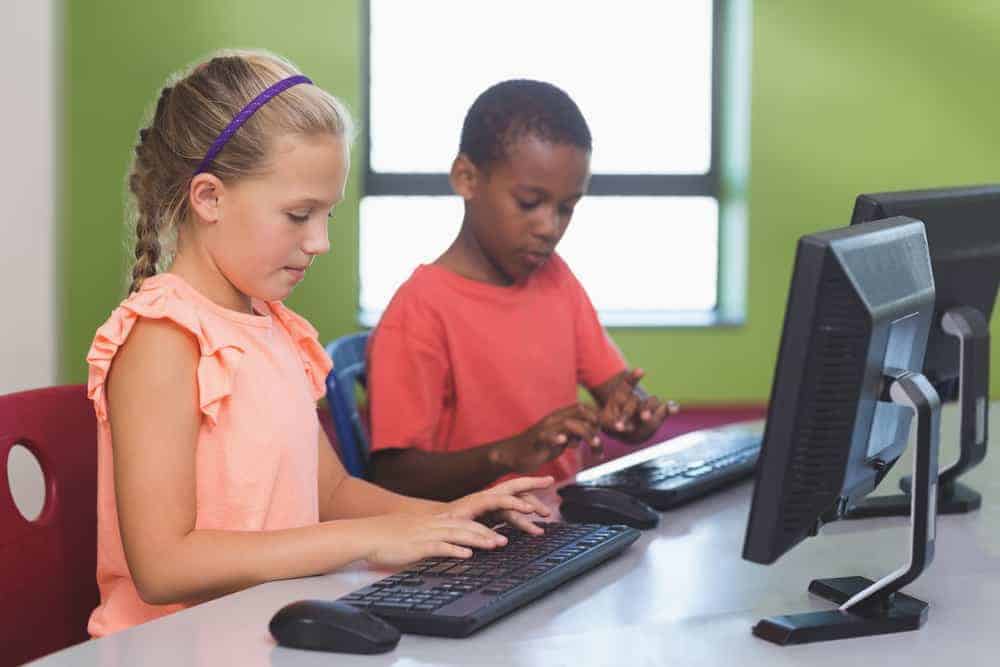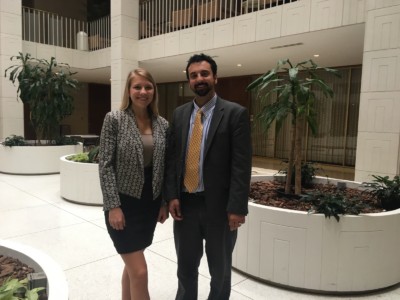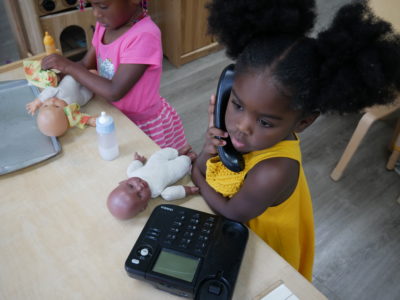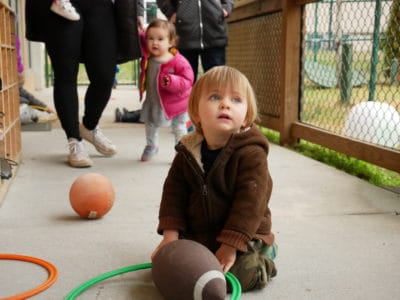Waterford Upstart, an online program that delivers academic software to children in 20 states, is in the process of expanding its national reach. Here in North Carolina, legislation was introduced earlier this month that would create a three-year pilot for children from low-income families in 10 districts who are not enrolled in preschool otherwise.
Nationally, a $14 million study is underway by the U.S. Department of Education on the program’s outcomes in five states. Upstart also just won a contest by TED, The Audacious Project, to grow the program to all 50 states.
But since the committee hearing where that legislation was given a favorable report, questions have arisen over what the program is, how online preschool can effectively teach young children, and how the program would affect pushes for expansion of NC Pre-K, the state’s preschool for at-risk 4-year-olds.
Rep. Graig Meyer, D-Orange, a member of the House education committee that moved the bill forward, said after the committee meeting he was left wondering if an online kindergarten readiness program would be helpful to children and families in the same way that other publicly-funded educational television programs are.
“I think a lot of the fears that are being stoked are, ‘Oh, we don’t want kids in front of a screen.’ Well, we do have kids in front of a screen,” Meyer said. “We support PBS. We use public funds to support Sesame Street … If the bill was interactive Sesame Street for early education, would we like it then because Sesame Street is something we’re familiar with and we think that’s a good screen time for kids? And would we avoid calling it preschool if we just thought it was interactive early childhood education in the way that Sesame Street is early childhood education?”
Meyer was also curious as to if the $500,000 pilot would produce better results than investing in the research-backed program that already exists.
“If it does have efficacy as a supplemental educational tool, should we spend half a million dollars on it or would it be better to spend half a million dollars on expanding pre-K slots?” he said.
The bill’s sponsor, Rep. Craig Horn, R-Union, said the House is committed this legislative session to increasing the number of children served by NC Pre-K.
A report released in January by the National Institute of Early Education Research (NIEER) found that out of the 62,287 eligible children — or around 52% of the state’s four-year-olds — NC Pre-K serves 29,509 children, or 47% of the potential population it could serve. That leaves 32,778 children who are eligible but unserved. Eligibility is determined by family income and takes into account other factors like limited English proficiency and special needs. The main barriers to expansion, the report found, were: “rising operating costs, including costs to recruit and retain qualified teachers, expand facilities and provide transportation,” and, “stagnant state reimbursement rates since 2012 that fail to cover NC Pre-K costs.”
As he said in committee, Horn views the program as a way to reach children who are not being served by NC Pre-K for a variety of reasons, like transportation barriers, illnesses in the family, or parental choice.
“The preferred option certainly is to put kids in front of high-quality teachers in the right environment, but there are kids that do not have access to that regardless, and we can’t throw those kids away,” Horn said. “So this is just another tool in the toolbox as we like to say, and it’s not meant to replace in any way, shape, or form, NC Pre-K.”
In an interview with EducationNC, Upstart’s executive director Claudia Miner said the program is not meant to be a replacement for in-person preschool.
“If parents don’t want to send a child or they can’t get a child to preschool, this is something that will help get them get ready for school,” Miner said. “We are not here to replace anything.”
The program offers pre-literacy, early literacy, and early math and science lessons to four-year-olds through 15 minutes of screen time a day. Miner said the program is individualized based on where the student is in different content areas.
“If a child learns quickly, they can go farther in the software. They will have more gains. If a child learns more slowly, they will get more drill, more repetition,” Miner said. “… But the whole idea is to teach them what they’ve learned to mastery so they won’t forget it and get everybody ready for kindergarten so that teachers can teach them when they get there, so the kids will be ready for that instruction. Some kids get farther. Some kids start with a larger deficit.”
In a 2015 study from the Evaluation and Training Institute, researchers found the program increased Utah children’s literacy skills on two assessments, Brigance and Bader, when compared with students who were not in the program. For the Brigance assessment, given to students before and after completing Upstart, the program had:
“Small effects in helping young children learn how to recite the alphabet, name and recognize lower case letters, as well as produce the sounds of lower case letters; medium size effects in helping children learn how to hear and see differences in letters and words; and large effects in helping children learn how to read basic vocabulary words found in preprimer reading programs.”
And on the Bader assessment, Upstart had: “Small effects in helping young children recognize pairs of words that rhymed; and medium size effects on helping young children learn how to blend and segment phonemes.”
Miner said part of the team’s strategy in creating pilots in states is to see how the program works among student populations with more diversity than in Utah.
“The idea is to take it across the country, but the idea is to figure out when the most efficient time is to go to the various states,” Miner said. “… But a big part of the program is connecting pilots with states to get research so that people can evaluate the program based on serving kids like their kids.”
A major concern raised by early childhood advocates alarmed at the rise of online programs like Upstart is the lack of interaction with other children — a component of early childhood programs meant to develop children socially and emotionally. Defending the Early Years and the Campaign for a Commercial-Free Childhood laid out their worries in a statement from October 2018.
“Virtual preschool may save states money, but it’s at the expense of children and families,” the statement reads. “Early learning is not a product. It is a process of social and relational interactions that are fundamental to children’s later development. Asserting that this process can take place online, without human contact, falsely implies that the needs of children and families can be met with inexpensive, screen-based alternatives.”
NIEER co-director Steven Barnett said online programs do not help with social and emotional development or physical health.
“I don’t see how it could have any positive effects on social-emotional development, and it may not have a negative effect on your physical development, but we’re dealing with a real problem with inactivity and obesity with young children, and if we view sitting them in front of a screen even for 15 minutes a day as an alternative to a vigorous play-based program, that’s not good.”
Miner said the program is working on activities that do target social emotional learning, such as lessons on sharing, waiting in line, and delayed gratification. She also stressed that the success of the program is dependent upon parental involvement and a coach helping parents through the process.
“Part of our conversation with parents is, one of the things that’s really important for them to know is how to play with other children, how to interact with other children,” Miner said. “Do you do play dates? Have you thought abut doing a play date? Children learn from play. Do they have a costume box? Did they dress up for Halloween?”
The legislation says the contractor may provide parents with a device and Internet access if needed. Horn said the $500,000 is a start and that further needs will be found out through the pilot study. Miner said the program has used wireless cards and even satellite dishes when connectivity has been an issue. “We have never had a child we could not get connected,” she said.
Barnett said he worries the program’s positive outcomes are on skills that could be taught through other programs that would be less expensive or through basic exposure to literacy.
“If you gave flashcards and some inexpensive books to parents, would you get the same results?” Barnett said. “The idea that it’s an inexpensive alternative, but wait, maybe there’s an even more inexpensive alternative if all you want is kids to get very simple literacy and math skills like counting and letter sound correspondence.”
He said all literacy skills do not necessarily lead to reading proficiency later down the road.
“These narrow skills don’t necessarily — we’re pretty sure they don’t — lead to long-term gains,” he said. “If you want kids to be reading at third grade, the kind of things that this focuses on, I don’t think do that. Yeah, kids are going to be better at sounding out words, but if they don’t know what those words mean, when they’re in third grade, they’re not really going to be reading… So it’s at least an open question, I would say an unanswered question, whether there are any persistent gains from this.”





